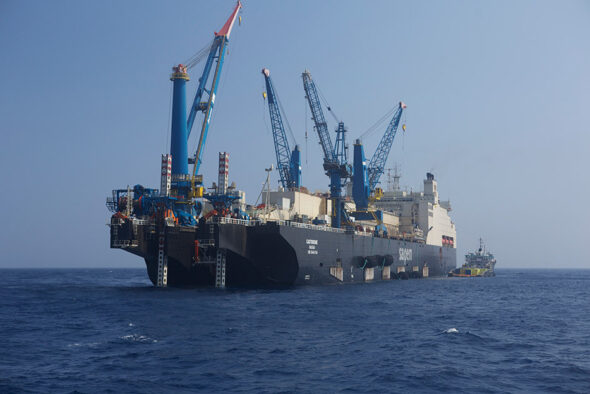What goes on in Poland on the 15th of June.
One of the builders of the Baltic Pipe sets off on his way to the Baltic Sea. It’s Castorone
The Castorone (PLV) unit, one of the largest submarine pipe-laying vessels, has set out from the port of Rotterdam to the Baltic Sea. This ship, along with Castoro Sei and Castoro 10, will build the Baltic section of the Baltic Pipe gas pipeline.
Castorone is the largest ship in the Italy’s Saipem’s fleet. It is 330 meters long and 38 meters wide. Over 700 people can be accommodated on board. This unit is equipped with a dynamic positioning (DP) system with six azimuth thrusters. The “production” section consists of 4 joining / welding sections of triple joints and 3 tensioners 250 tons each.
Castorone’s task will be to lay, among others, the section of the Baltic Pipe in the Swedish Exclusive Economic Zone, which is to be approximately 85 km long. Construction is to start in the last week of June.
The Czechs sent Poles a draft agreement on the Turów Mine. Negotiations are to start on Thursday
The Czechs sent Poland a draft intergovernmental agreement regarding the Turów Mine. It contains conditions that the Czechs expect Poland to meet after the possible withdrawal of the complaint to the Court of Justice of the EU. According to Prague, the mining of coal in Turów is causing environmental damage on the Czech side of the border. „We will start negotiations on Thursday, and we are ready for tough negotiations,” Richard Brabec, Minister of Environment of the Czech Republic, stated.
Brabec also announced in social media that a draft agreement has been proposed, the framework of which was agreed two weeks ago between Poland and the Czech Republic. As announced, the Czechs presented a draft agreement on measures to compensate and reduce the impact of the operation of the mine in Turów on their groundwater. „The costs of covering the tasks and investments limiting the mine’s influence on the neighboring Czech lands will amount to EUR 50 million, i.e. five million more than the original assumptions,” the Czech media reported.
The Court of Justice of the European Union ordered Poland to immediately stop mining at the Turów lignite opencast mine at the end of May. This remedy is supposed to be in place until the Czech Republic’s complaint is resolved. Last week, the Czech government ordered the Government Plenipotentiary for the Representation of the Czech Republic before the Court of Justice of the EU, Martin Smolek, to impose a fine of EUR 5 million per day on Poland, but at the same time the Czechs announced that they were close to accepting a draft agreement under which they would withdraw the lawsuit from the Court.









